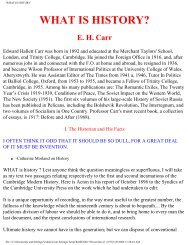The bronze age and the Celtic world - Universal History Library
The bronze age and the Celtic world - Universal History Library
The bronze age and the Celtic world - Universal History Library
You also want an ePaper? Increase the reach of your titles
YUMPU automatically turns print PDFs into web optimized ePapers that Google loves.
152 THE BRONZE AGE AND THE CELTIC WORLD<br />
<strong>the</strong> Villa-nova culture, which is not unlike that of <strong>the</strong> Dorians, so that it seems reasonable<br />
to equate this culture with <strong>the</strong> Osco-Umbrian or P dialects.<br />
<strong>The</strong> Sabines, as we have seen, are said to have come from Amiternimi; which is on<br />
<strong>the</strong> north-eastern slope of <strong>the</strong> Apennines, or ra<strong>the</strong>r in a valley which opens out on that<br />
side. We should, <strong>the</strong>refore, expect <strong>the</strong>m to have been a P people. But, according to<br />
Dionysius, <strong>the</strong>y over-ran a region peopled by <strong>the</strong> Aborigines, who we have found reason<br />
for thinking were a Q<br />
people, <strong>and</strong>, though doubtless <strong>the</strong>y expelled <strong>the</strong> fighting men, a<br />
good number are likely to have remained behind. It is not surprising, <strong>the</strong>refore, that <strong>the</strong>re<br />
should be some uncertainty as to whe<strong>the</strong>r <strong>the</strong> original Sabines spoke a P or a Q dialect.<br />
AU <strong>the</strong> Itahan evidence is consistent with <strong>the</strong> view that <strong>the</strong> men of <strong>the</strong> leaf-shaped<br />
sword were Q speaking, while <strong>the</strong> men with <strong>the</strong> iron sword spoke P tongues, but before<br />
we come finally to a decision, it might be well to make a fur<strong>the</strong>r test elsewhere. We<br />
have seen that <strong>the</strong> refugees from <strong>the</strong> mountain zone, armed with Type G swords, fled<br />
down <strong>the</strong> Rhone, <strong>the</strong> Loire, <strong>and</strong> <strong>the</strong> Seine, <strong>and</strong> that, while <strong>the</strong> men with <strong>the</strong> iron swords<br />
pursued <strong>the</strong>m down <strong>the</strong> two former valleys, <strong>the</strong>y left <strong>the</strong> Seine valley alone. Sir John<br />
Rhys <strong>and</strong> his supporters have suggested that Q speech was at one time spoken in Gaul,<br />
<strong>and</strong> have cited certain place-names in support of <strong>the</strong>ir case.'' <strong>The</strong> value of this evidence<br />
has been disputed, but <strong>the</strong>re is one name, in two forms, which so obviously belongs to<br />
Q speech, that its value cannot well be denied, <strong>and</strong> this is Sequana, <strong>the</strong> ancient name for<br />
<strong>the</strong> Seine, <strong>and</strong> Sequani, <strong>the</strong> tribe who hved by its banks. It cannot be merely a<br />
coincidence that <strong>the</strong> best attested Q names have been noted just where Type G swords<br />
are found not followed by iron swords, <strong>and</strong> this case, bearing out as it does <strong>the</strong> general<br />
tenoiir of <strong>the</strong> Itahan evidence, seems to me to be conclusive.<br />
I would submit, <strong>the</strong>refore, that <strong>the</strong> archaeological evidence, which I have given<br />
in this <strong>and</strong> in previous chapters, proves, as conclusively as <strong>the</strong> circumstances of <strong>the</strong> case<br />
are hkely to admit, that <strong>the</strong> <strong>the</strong>sis of Sir John Rhys that two waves of people left<br />
Central Europe for Italy <strong>and</strong> <strong>the</strong> west, <strong>the</strong> first speaking a Q <strong>and</strong> <strong>the</strong> second a P tongue,<br />
is absolutely correct, though modifications need to be made in <strong>the</strong> apphcation of this<br />
<strong>the</strong>ory to Greek l<strong>and</strong>s. His view that <strong>the</strong> P Folk were <strong>the</strong> people of <strong>the</strong> Swiss<br />
lake-dweUings we have seen good reason to reject.<br />
'9 Rhys (1894) 112.







